-
CAR INSURANCE
Car InsuranceFlat 80%* OFFGet right cover at best price on your car insurance policy. Unlock your corporate superpower today.GET QUOTESWhat does your car insurance cover you for?Comprehensive coverageLiability coveragePersonal accident coverageZero-depreciation coverMany more add-on coversGet your car insured with the best features - completely online, right now!CloseWhat do you get at Elephant Insurance?Corporate Superpower of best Car Insurance DealsAI-Based Car Insurance RecommendationsHandpicked Insurers for Car InsuranceUnmatched Prices on Car Insurance PremiumsInstant Policy Issuance for your vehicle100% Assistance from ExpertsDigital Relationship ManagerBest-in-Class Claims ServiceLifetime Personalised AccountRenewal Management
-
TWO-WHEELER
INSURANCE
Two-Wheeler InsuranceStarting at Rs.546* only.Get right cover at best price and insure your two-wheeler for a joy ride. Unlock your corporate superpower today.GET QUOTESWhat does your two-wheeler insurance cover you for?Comprehensive coverageLiability coveragePersonal accident coverageZero-depreciation coverMany more add-on coversGet your two-wheeler insured with the best features - completely online, right now!CloseWhat do you get at Elephant Insurance?Corporate Superpower of best Two-wheeler Insurance DealsAI-Based Two-wheeler Insurance RecommendationsHandpicked Insurers for Two-wheeler InsuranceUnmatched Prices on Two-wheeler Insurance PremiumsInstant Policy Issuance for your vehicle100% Assistance from ExpertsDigital Relationship ManagerBest-in-Class Claims ServiceLifetime Personalised AccountRenewal Management
-
TERM LIFE
INSURANCE
Term Life InsuranceRs.1 crore life cover at Rs.503/month* only.Securing your loved ones future is not expensive, it is priceless! Be a superhero by unlocking your corporate superpower today.GET QUOTESWhat does your term life insurance cover you for?Death benefitsCritical illnesses coverAccidental death benefitWaiver of premiumMany more add-on coversGet your term life insurance with the best features - completely online, right now!CloseWhat do you get at Elephant Insurance?Corporate Superpower of best Term Life Insurance DealsAI-Based Term Life Insurance RecommendationsHandpicked Insurers for Term Life InsuranceHandpicked Insurers for Term Life InsuranceInstant Policy Issuance for you and your family100% Assistance from ExpertsDigital Relationship ManagerBest-in-Class Claims ServiceLifetime Personalised AccountRenewal Management
-
HEATLH
INSURANCE
Health InsuranceGet Rs.5 lakh health cover at Rs.18/day* only.Protecting your health is always our priority. Be a superhero by unlocking your corporate superpower today.GET QUOTESWhat does your health insurance cover you for?Unexpected medical billsPre and post hospitalisation billsDay care treatmentsMaternity, newborn care and organ donor expensesMany more add-on coversGet your health insurance with the best features - completely online, right now!CloseWhat do you get at Elephant Insurance?Corporate Superpower of best Health Insurance DealsAI-Based Health Insurance RecommendationsHandpicked Insurers for Health InsuranceUnmatched Prices on Health Insurance PremiumsInstant Policy Issuance for you and your family100% Assistance from ExpertsDigital Relationship ManagerBest-in-Class Claims ServiceLifetime Personalised AccountRenewal Management
-
CYBER PROTECT
Cyber Protect InsuranceGet Rs.1 lakh cyber protection cover at Rs.55/day* only.Don't be a victim of cyber fraud! Get right cover at best price on your cyber insurance policy. Unlock your corporate superpower today.GET QUOTESWhat does your cyber insurance cover you for?Legal protectionUnauthorised online transaction coverPhishing and email spoofing coverCyber stalking and identity theft coverCyber extortion and many more coveragesGet your cyber insurance with the best features - completely online, right now!CloseWhat do you get at Elephant Insurance?Corporate Superpower of best Cyber Insurance DealsAI-Based Cyber Insurance RecommendationsHandpicked Insurers for Cyber InsuranceUnmatched Prices on Cyber Insurance PremiumsInstant Policy Issuance for your cyber protection100% Assistance from ExpertsDigital Relationship ManagerBest-in-Class Claims ServiceLifetime Personalised AccountRenewal Management
-
OTHER
PRODUCTS5
Critical Illness InsuranceA must-have protection to secure you against critical illnesses.GET QUOTESPersonal Accident InsuranceAccidents are sudden and can cause damage to your financial planning as well.GET QUOTES
Car Insurance Blogs
Helping you to make informed decisions about insurance
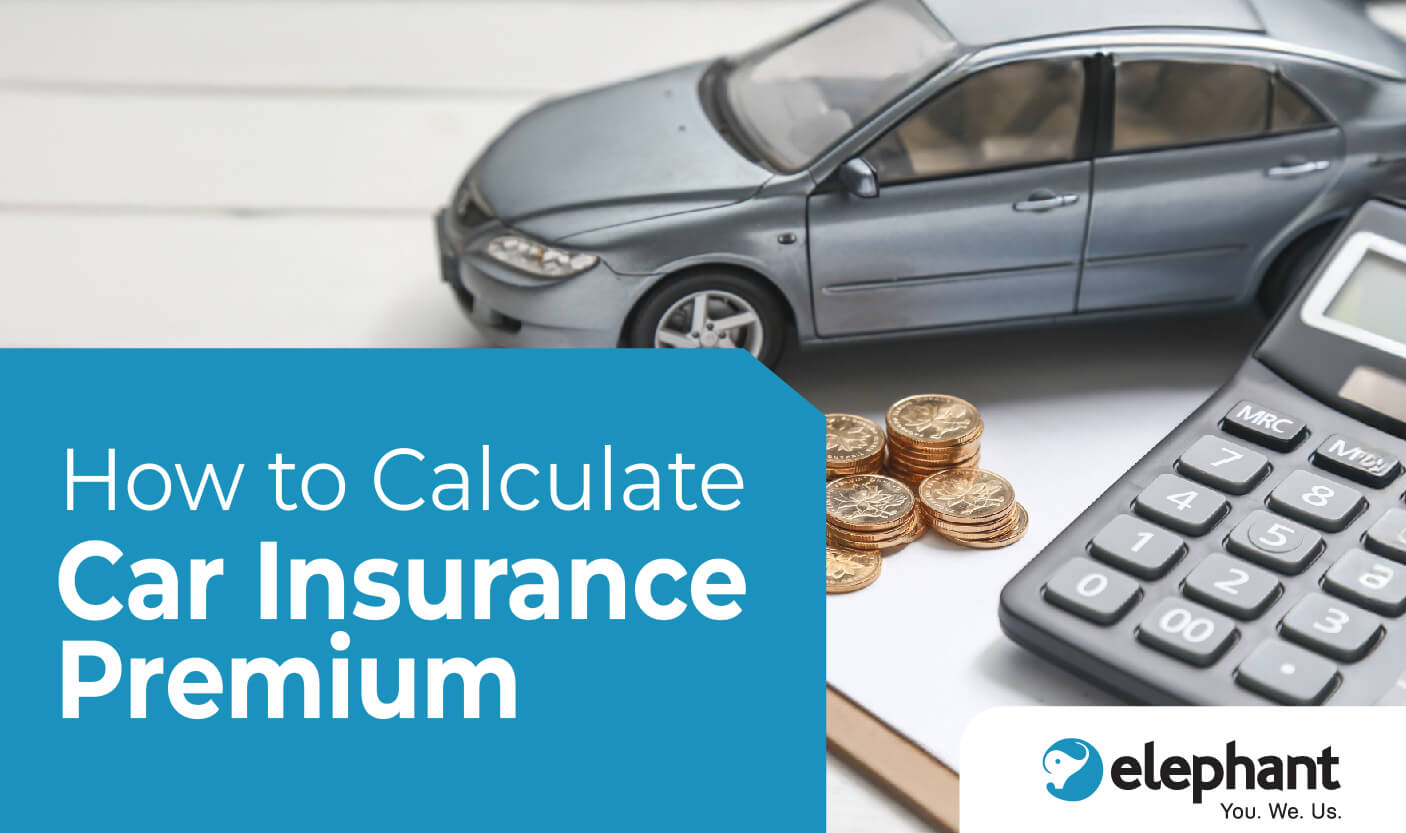
How to Calculate Car Insurance Premium: A step-by-step guide to calculating your own car insurance premium
published on December 27, 2024
For every responsible car owner in India, acquiring car insurance is vital but it can be quite a task when it comes to determining the cost/premiums of the insurance. In order to help you make informed decisions and for you to accurately estimate your coverage costs, we will break down the important factors to consider in this insightful blog.
Getting familiar with Car Insurance
An individual is protected from unpredictable events such as accidents, theft/burglary or damage if he has car insurance policy. To ensure financial assistance in such scenarios, you pay a premium. The cost of your premiums may, however, be impacted by multiple variables.
-
Vehicle Type:
-
Distance Driven:
-
Location:
-
No Claim Bonus (NCB):
-
Coverage Options:
Opting for comprehensive car insurance coverage increases your expenses but protects your vehicle along with the mandatory Third Party Insurance.
-
Additional Features:
Key Influencers of Your Premium
Due to elevated costs of repairs for high-end luxury vehicles, they incur higher premium costs. Manageable premium rates are for economical cars such as hatchbacks.
Premiums can also be influenced by the amount of distance you have driven. Pay as you drive is a type of insurance the calculates the premium you will be paying as per the distance you have driven.
Your premium range can be affected as per the location your car is registered in. In densely populated or high-risk areas, your rates could rise, whereas they could decrease in less populated areas.
You might save around 50% on your own damage premiums by qualifying for NCB due to not making any claims in the previous year.
Adding extra coverage options such as zero depreciation cover and roadside assistance may result in higher premiums.
-
Select Your Coverage:
-
Determine Your IDV (Insured Declared Value):
-
Assess Add-On Options:
-
Review Your NCB:
-
Factor in Vehicle Details:
-
Provide Personal Information:
-
Use Online Calculators:
Steps to Estimate Your Premium
3rd-Party or Comprehensive Coverage is completely your choice
The current market value of your vehicle affects both the premium and compensation in the event of total loss.
Consider optional features and select only those essential to your coverage.
If you’ve maintained a claim-free record, you may be eligible for a reduced premium.
Age, make, and model of the vehicle impacts the overall premium.
Age, driving experience, and location also affect the final calculation.
Many online aggregators provide tools to help you calculate your premium based on the provided data.
Cost-Saving Strategies
- Choose a higher voluntary deductible to lower your insurance costs.
- Maintain a clean driving history to prevent costly penalties.
- The installation of anti-theft devices will enhance overall car safety and lower car insurance premiums.
Conclusion
Understanding all the factors that impact your insurance premiums makes it simple to make a well-informed choice and select a customized car insurance policy for yourself.
We are constantly available to assist you. Get in touch with us at 1800 266 9693 or send us an email at support@elephant.in for more information on car insurance options, or just head to Elephant.in!
*Terms and conditions apply. The information provided in this article is generic in nature and for informational purposes only. It is not a substitute for specific advice in your own circumstances. You are recommended to obtain specific professional advice from before you take any/refrain from any action. Tax benefits are subject to changes in tax laws. Please contact your tax consultant for an exact calculation of your tax liabilities.| EL/BLOGS/24-25/18

What to Know About Insurance When Buying a New Car
published on December 11, 2024
Even though purchasing a new car can be a thrilling experience, it is important not to overlook one crucial aspect: car insurance. To protect your investment from any unpredictable situations, it is essential to know about the intricacies of car insurance. Here is a simple guide to assist in understanding car insurance while buying a new vehicle.
Get the Basics Right
Car insurance is an agreement between an individual and an insurance company that provides insurance coverage for vehicles. On receiving the premium amount, the insurance company will cover specific expenses in case of damage, theft, or accidents involving your car.
In India, it is required by law to have third-party car insurance. It includes payments for harm or injuries to others, excluding damage to your personal vehicle. Choosing full coverage insurance is advised because it includes protection for both third-party losses and any damages to your own car.
Types of Car Insurance
-
Comprehensive Insurance:
-
3rd Party Insurance:
Both third-party claims and damages to your vehicle are covered. While more expensive, the extensive protection offered can provide peace of mind.
As the minimum required by law, this covers damages to others but leaves your vehicle unprotected. Although cheaper, this option could expose you to additional costs if the vehicle sustains damage.
What Influences Your Premium?
-
Car Make and Model:
-
Age of the Car:
-
Location:
-
Driving History:
-
Coverage Type:
Extensive protection is provided when one acquires a comprehensive car insurance, even though it costs more.
Higher premiums are typically attracted by high-end vehicles due to increased repair costs.
Older cars generally come with lower premiums because of reduced market value.
Living in metropolitan areas can lead to higher premiums due to greater risks of accidents or theft.
Lower premiums can be earned by maintaining a clean driving record, as it suggests a lower risk to insurers.
Also Read: Understanding Different Types of Car Insurance Coverage
The No Claim Bonus (NCB)
The No Claim Bonus (NCB) serves as an incentive for drivers who exhibit responsible behavior on the road. If there are no claims filed within the policy year, policyholders can receive a discount of up to 50% on their own damage premium for the next year. This helps to save money and promote safer driving behaviors.
Understanding Insured Declared Value (IDV)
The maximum amount that the insurance company will pay out in the event that the vehicle is declared stolen, or a total loss is the IDV, which represents the car’s present value. Better coverage is provided by a higher insured stated value; nevertheless, the premium is usually higher. It is critical to strike the ideal balance between scope and expense.
Exploring Add-ons and Riders
-
Zero Depreciation Cover:
-
Engine Protection:
-
Roadside Assistance:
Provides peace of mind if the vehicle breaks down.
Full compensation is provided without accounting for depreciation, making this a smart choice for new car owners.
Covers engine damage from specific issues like waterlogging—a real concern in some areas.
Choosing the Right Insurance
-
Compare Policies:
-
Assess Premium vs. Coverage:
-
Check Claim Settlement Ratios:
-
Read the Fine Print:
-
Consider Your Driving Patterns:
You will come across a good car insurance policy after scouting through different plans and their quotes both online and offline.
Ensure the policy meets protection needs, rather than simply opting for the cheapest option.
This indicates how effectively an insurer handles claims—an essential factor in the decision.
Comprehend what is covered and not covered to prevent unexpected surprises in the future.
Regular drivers or individuals in high-risk locations could see greater advantages with comprehensive insurance.
Insuring Your New Car
Though dealers commonly provide insurance at the time of sale, it may not always be the most advantageous option. Make sure to compare quotes from different providers as many of them have fast online quotes available for a more efficient evaluation of options.
Don’t Forget Your NCB Transfer
When upgrading from an old car, transferring the No Claim Bonus to the new policy can lead to significant savings. Insurers should be notified about the NCB transfer during the purchase process.
Navigating the Claims Process
- Insurers should be notified immediately after an incident.
- A police report should be filed if needed, especially for theft or major accidents.
- A claim form should be submitted to the insurance company.
- Necessary documents, such as a driving license and car registration, must be provided.
- The insurer should inspect the car to assess the damage.
Conclusion
Getting the proper insurance for a new car is just as important as buying the car itself. By understanding the fundamentals, conducting comparisons, and making knowledgeable choices, both vehicle and financial protection can be guaranteed. Always aim for a balance between coverage and cost to find the ideal policy.
Reach out at 1800 266 9693, email support@elephant.in, or visit Elephant.in to explore car insurance options!
*Terms and conditions apply. The information provided in this article is generic in nature and for informational purposes only. It is not a substitute for specific advice in your own circumstances. You are recommended to obtain specific professional advice from before you take any/refrain from any action. Tax benefits are subject to changes in tax laws. Please contact your tax consultant for an exact calculation of your tax liabilities.| EL/BLOGS/24-25/18
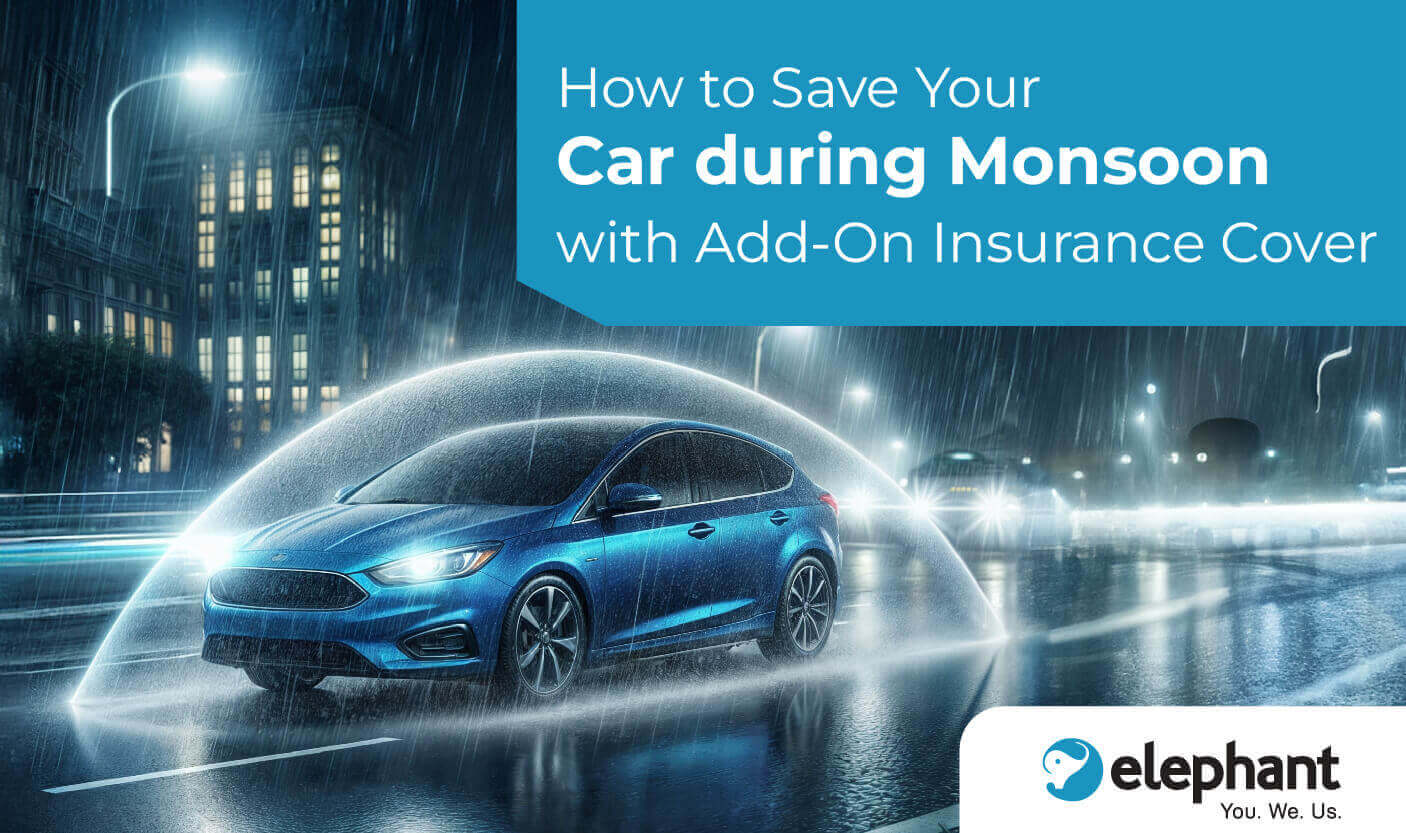
How to Save Your Car during Monsoon with Add-On Insurance Cover
published on August 23, 2024
Monsoons on Indian roads can be particularly harsh on cars, with flooded streets, potholes concealed beneath water, and impaired vision posing significant risks of damage. While regular car insurance covers basic damages, the monsoon often necessitates more comprehensive coverage. This is where additional insurance coverage becomes crucial. Add-ons expand the coverage given by the regular insurance policy to offer additional protection from specified risks. In this article, we shall outline some of the different types of add-on covers that help you protect your vehicle during the rainy season.
Understanding Add-On Insurance Covers
An add-on is an additional cover that you buy over and above your basic car insurance policy for extra protection in multiple scenarios. Here are some must have car insurance add-ons that can prove to be extremely helpful during the monsoons:
- Engine Protection Cover
- Zero Depreciation Cover
- Roadside Assistance Cover
- Return to Invoice Cover
- Consumables Cover
- Hydrostatic Lock Cover
- Engine Protection Cover
Your car’s engine is its heart, and it’s particularly vulnerable to waterlogging. An engine protection add-on would help to reduce the costs of repair or replacement in case your vehicle’s engine gets damaged due to water. Such an add-on coverage feature is critical, given that the standard insurance policies do not provide coverage if the engine gets damaged due to water seepage.
Benefits of Engine Protection Cover:
- Covers the cost of repair or replacement on any damage arising from water collection to the engine.
- Provides you with peace of mind in times of heavy rains and floods.
- Prevents expensive engine repairs.
- Zero Depreciation Cover
It also goes by the name of bumper-to-bumper car insurance coverage. This particular coverage will ensure you get the full claim value sans any depreciation deduction. During monsoons, you can always expect to experience slipperiness of the roads, minor accidents and damages, and this is where this cover will come in the most handy. With this, you will not need to pay for a part replacement out of your pocket as the insurer will take care of it.
Benefits of Zero Depreciation Cover:
- The total claim amount without deduction of depreciation.
- Ideal for new vehicles and luxury models.
- Covers the cost of replacing damaged items without taking into account their devaluation.
Also Read: All You Need To Know About Bumper To Bumper Car Insurance
- Roadside Assistance Cover
Breakdowns can be nerve-wracking, especially in the rain. But with your roadside assistance cover, help is just a call away! From towing to minor repairs, you can get back on the road in absolutely no time. Roadside assistance coverage is a saviour, it gives you peace of mind, offering towing, emergency repairs, and battery jump-starting. It can also provide lodging for you if you are a long way from home.
Advantages of Roadside Assistance Cover:
- Immediate help is available if your car breaks down.
- Towing services to the nearest garage.
- Peace of mind in emergencies.
- Return to Invoice Cover
If your car is beyond repair or is stolen, a standard insurance policy will only pay out the present market value, which may be considerably less than what you paid for it. A return-to-invoice cover bridges this gap by paying the original invoice value of the car along with road tax and registration fees.
Benefits of Return to Invoice Cover:
- Full compensation for the car’s invoice value.
- Covers the gap between market and invoice values.
- Best used for new vehicles, providing more financial protection.
- Consumables Cover
In the course of repairing, minor parts like nuts, bolts, engine oil, brake oil, and such are replaced. The cost of such expenses can really add up, and typical insurance doesn’t include them in coverage. A consumables policy takes care of those costs so you don’t have to reach into your pocket.
Benefits of Consumables Cover:
- Pays the cost of consumables replaced at the time of repair.
- Reduces out-of-pocket expenses.
- Offers complete protection at the time of repair.
How to Choose the Right Car Insurance Add-Ons
The right selection of add-ons depends on multiple factors, such as the age of your car, the way you drive it, and the monsoon conditions that prevail in your area.
Here are some tips to help you choose the right Car Insurance add-ons:
1.Assess Your Needs:
Think of the specific threats you will be facing through the monsoon. If you stay in a flood-prone area, the must-have features include engine protection and roadside assistance cover
2. Assess the Age of Your Car:
New cars benefit more from zero-depreciation and return-to-invoice coverage.
3. Keep in Mind Your Budget:
While add-ons provide you with extra coverage, they are capable of escalating your costs as well. So choose the best value for your needs.
4. The Devil Is in the Details:
Be aware of the terms and conditions of every add-on to get an idea about the coverage.
Conclusion
Though an incredible season, monsoons can, at times, prove to be a little harsh on your car. But the right insurance protection can save your day and your car, too! Take time to study and learn about different types of add-on covers that can prove to be very beneficial in the long run. Engine protection, zero depreciation, roadside assistance, return to invoice, consumables, are some of them that can help protect your car.
Call 1800 266 9693 or email us at support@elephant.in if you have any questions. Visit Elephant.in for the best car insurance plans!
*Terms and conditions apply. The information provided in this article is generic in nature and for informational purposes only. It is not a substitute for specific advice in your own circumstances. You are recommended to obtain specific professional advice from before you take any/refrain from any action. Tax benefits are subject to changes in tax laws. Please contact your tax consultant for an exact calculation of your tax liabilities.| EL/BLOGS/24-25/13
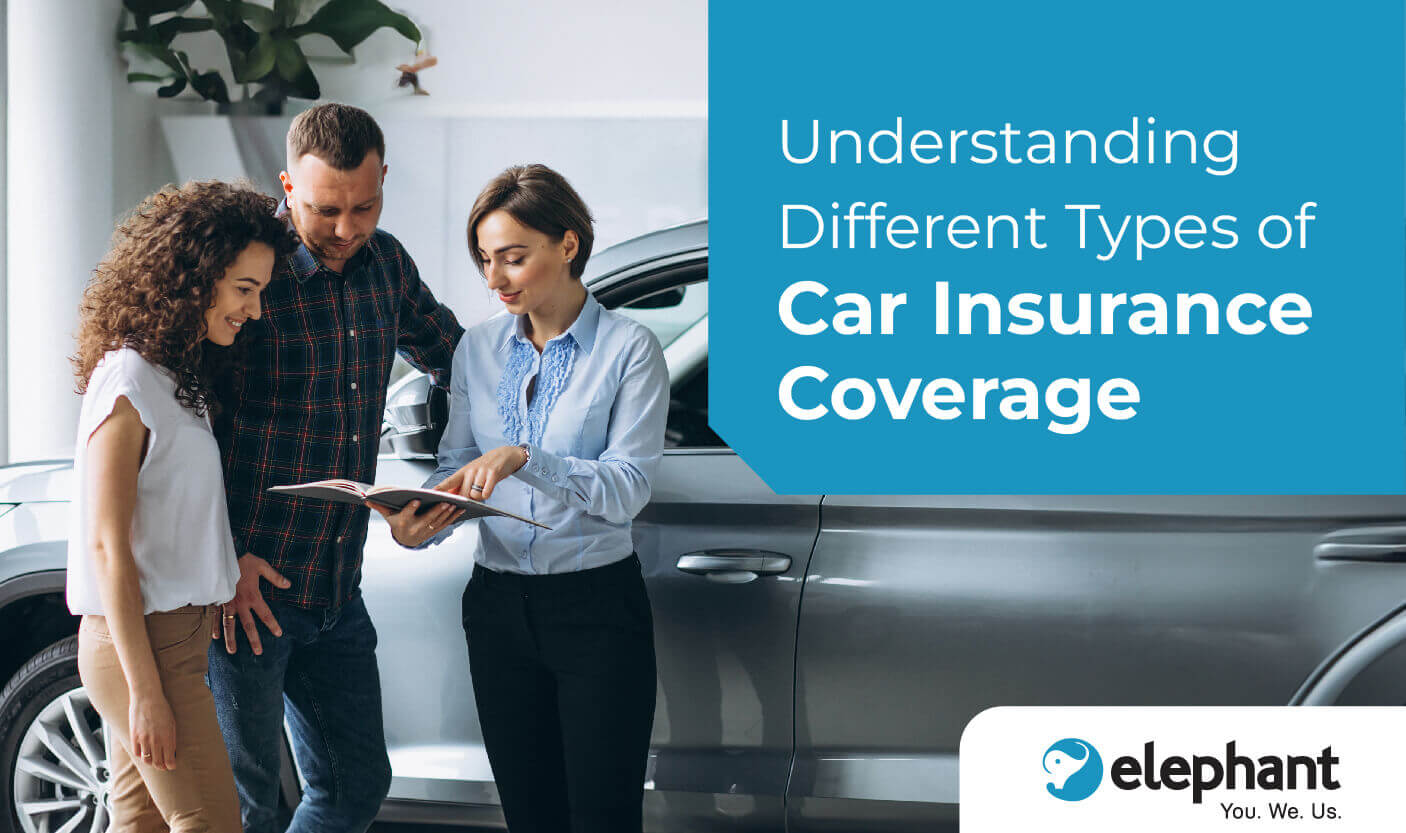
Understanding Different Types of Car Insurance Coverage
published on August 23, 2024
As a car owner, you must ensure your vehicle is well-maintained, and you follow traffic rules and drive carefully. Sometimes, even if you take all necessary measures, accidents tend to occur due to mechanical problems, damaged tyres or natural calamities like floods and earthquakes and poor road conditions to name few. Car insurance is important to cover damage costs during such incidents.
We will look at some of the numerous car insurance plans available today to help you make the best financial decision.
Importance of Car Insurance
The roads in India range from quiet country roads to busy urban ones and well-kept highways. Accidents can happen whenever and in any area. Car insurance fills in as a financial security, safeguarding you from the obligation of paying for harm, medical services costs or lawful commitments coming about because of accidents.
Car insurance can help you in the following ways:
-
Financial stability:
For example, if an accident in your car takes place, this coverage will be activated, and it will cater for the maintenance and replacement expenses incurred.
-
Third-party liability coverage:
In situations where personal injuries to third parties are sustained or their properties are damaged, this policy stands in for the financial liabilities arising out of any mishap occurred due to third party liability.
Also Read: Useful Tips to Consider When Buying Insurance for Your New Car
Types of Car Insurance Coverages and Add-on
Insurance coverage relates to the different monetary assurances that are presented for your car. Notwithstanding standard inclusion, you have the choice to choose different extra elements to help the degree of security given by the approaches. First, we’ll discuss the five types of car insurance coverage available in India:
- Third-Party Liability Only Cover:
With this vehicle insurance contract, you will get the following benefits:
- Costs for fixing or replacing the 3rd party’s vehicle that was harmed.
- Costs brought about for hospitalisation and clinical consideration for the 3rd party involved.
- Legal liabilities brought arising out of bodily injury or death of third part, including passengers and pedestrians due to an accident caused by the insured vehicle. Having third-party liability insurance is the minimum legal requirement under the Motor Vehicles Act of 1988. All vehicle owners need to have it in order to avoid any legal obligations.
- Collision Damage or Own Damage (OD) Cover:
The insurance company compensates for the repair or restoration of the damaged car. These rates commonly depend on the RTO)
Also Read: How to Select Car Insurance Tailored to Your Needs!
- Personal Accident Cover:
If in an accident, the driver is injured (or the owner of the car), this add-on cover comes into play. It covers the cost of hospitalisation and several other medical expenses.
- Zero Depreciation Insurance:
In India, this kind of coverage is frequently offered as an additional option with car insurance plans. Imagine that you need new parts for your wrecked car. When processing claims, the insurance company will consider the components’ decreased value. You will receive the full claim amount if you have zero depreciation coverage, as there is no expenditure depreciation included.
- Comprehensive Car Insurance Coverage:
The Comprehensive Car Insurance gives the most extensive assurance by covering your vehicle against any man-made activities such as robbery/theft/vandalism and natural calamities such as floods, earthquakes. It can also be upgraded with the help of add-on policies which provide additional benefits along with the fundamental protection that the plan provides.
Conclusion
Now that you are aware of the many kinds of car insurance that are out there, evaluate your demands and carefully consider your budget. Compare the various types of coverages and their premium costs choose the one that is perfectly apt for your needs and traverse the roads with confidence!
Contact our experts by calling 1800 266 9693 or emailing support@elephant.in if you have any questions. Visit Elephant.in for the best car insurance plans!
*Terms and conditions apply. The information provided in this article is generic in nature and for informational purposes only. It is not a substitute for specific advice in your own circumstances. You are recommended to obtain specific professional advice from before you take any/refrain from any action. Tax benefits are subject to changes in tax laws. Please contact your tax consultant for an exact calculation of your tax liabilities.| EL/BLOGS/24-25/12
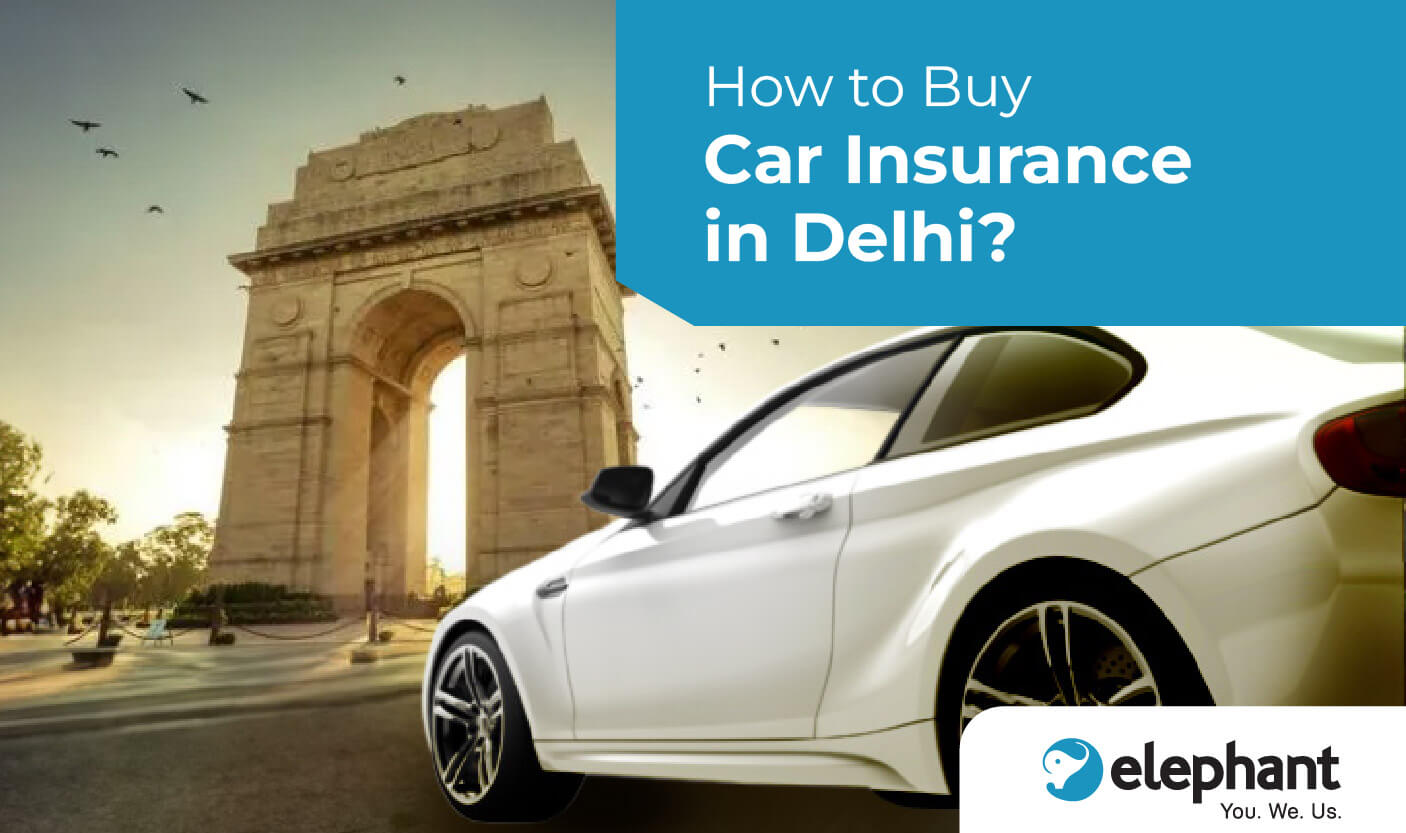
How to Buy Car Insurance in Delhi?
published on June 22, 2024
Living in Delhi is blissful, yet the vibrant city comes with its transportation issues, requiring you to purchase your car. Now, whether you are new at car purchasing or an owner of multiple vehicles, choosing your vehicle can be an exhilarating feeling with one tiny confusion- car insurance. Navigating through the various ups and downs of understanding and selecting car insurance, can be fascinating yet taxing- one sharp turn can cause you to lose your money, time, and peace. Take this as a guidebook towards understanding your car insurance journey.
Importance of Car Insurance
The freedom of owning one’s car comes with its set of responsibilities, where you need assistance. Car Insurance serves that purpose through:
- Mandatory Protection: Indian law mandates having at least third-party liability (TP) insurance for all vehicles for financial protection in the case of accidents, injury, or property damage of the third party. Without it, you could be held liable for hefty compensation costs.
- Peace of Mind: Life is unpredictable, with curveballs in the form of accidents, theft, and natural disasters. Comprehensive car insurance is a safety net, maintaining your peace of mind by covering a wider range of situations beyond TP.
- Financial Security: Car repairs are an expensive occurrence, and having comprehensive insurance can lessen the dent in your pocket while maintaining the quality of service provided.
- Customisable Coverage: Car insurance doesn’t follow ancient principles, in the modern era. Your car insurance add-on covers can include engine protection, zero depreciation (protects against depreciation value on your car), and roadside assistance, ensuring you’re prepared for various scenarios.
- Faster Repairs: Did you know? Many insurance companies have a network of cashless garages in Delhi. This provides you the liberty of getting your car repaired without upfront payments, simplifying the process and minimising downtime.
Understanding the Pillars of Car Insurance in India
Car insurance sounds simple, right? While in the broader spectrum, it is, what you need to keep in mind are the variances in car insurance, keeping the Indian law and legislation at the front:
- Third-Party Liability (TP) Insurance: This is mandatory coverage, shielding you from major financial losses occurring due to injuries or damage caused to a third party’s vehicle, or property. Unfortunately, it doesn’t provide any protection from damages occurring to your car.
- Comprehensive Car Insurance: This powerhouse policy goes beyond the basics of TP insurance. It typically includes:
- Own Damage Cover: This protects your car from accidents, theft, fire, natural disasters, riots, and vandalism.
- Personal Accident Cover: This can be an addition to your car insurance plan, providing financial assistance in case you or your co-passengers sustain minor or major injuries during an accident.
- Add-on Covers: These can be added to your existing car insurance to enhance it. You can opt for engine protection cover, zero depreciation cover, and roadside assistance.
The beauty of India-based car insurance is that you can tailor your plan to suit your requirements, evolving from vehicle to vehicle.
The Price Tag of Protection: Factors Affecting Your Car Insurance Premium
Everything depends upon circumstances as well as variables that play an important role in determining the outcome. The premium you pay for your car insurance policy is influenced by these key factors:
Your Car:
Your insurance is an extension of your car and naturally, its Insured Declared Value, Age, and Engine Capacity form major deciding points. A higher IDV can help you get a higher premium, while larger engines can lead to a steeper premium. Additionally, with age, your car’s value decreases, impacting the premium amount
Your Driving Record:
How you drive is a mark of your car’s upkeep and propensity to mitigate situations like accidents and threats. Your skill set can save or cost you- divers with a clean record and a history of safe driving are often eligible for attractive discounts.
Your Location:
In certain areas of Delhi, traffic congestion and theft are common occurrences. Due to this factor, insurance companies may increase rates slightly for auto insurance in those regions. It’s similar to typical insurance where the cost increases slightly as the risk increases.
Discovering a reliable insurance companion in Delhi
The market is teeming with options for car insurance. Selecting the right insurance that all fits your requirements can be an uphill climb. However, do not be concerned, as the following tips will serve as a starting point:
- Seek a company with a reputable name and sound financial standing for handling claims effectively and fairly. You need someone reliable to support you during your most crucial moments.
- Many garages in Delhi now offer cashless payment options, providing increased convenience for customers. No need for upfront payments and faster repairs equals a double victory!
- Supportive and attentive customer service is crucial. When you have an inquiry or require assistance, you seek a company that is easily accessible and efficient in resolving issues.
- Think about companies that have easy-to-use websites and mobile apps. These can simplify the process of managing your policy and submitting claims. End the hassle of dealing with paperwork!
Two Options for Coverage: Agent or Internet
Two primary methods to obtain car insurance in Delhi are available.
- Agent at Your Service: Insurance agents are available to clarify various policy choices, review quotes from different companies, and assist with completing the application. This individualised gesture can be particularly beneficial for individuals who are purchasing a car for the first time.
- Self-service on the Internet: Many insurance providers offer convenient online platforms where customers can compare car insurance quotes, tailor their policies, and make purchases without the need for a middleman. This choice is convenient, frequently quicker, and allows you to navigate through.
Purchase of Insurance: Documents you need
Ready to buy your car insurance? Keep these handy:
- Use Registration Certification
- Previous Year Policy Copy
- Pan card and Aadhar card for CKYC verification
Choosing wisely: Paying attention to the details.
Post receiving quotes from various companies, make sure to carefully compare them before making a decision. Here are some things to consider:
- What’s included
- What is not included
- Settlement ratio of claims
- Customer feedback
Conclusion: Confidence on the Road
Remember, the car insurance you choose is an investment that protects your car, your finances, and your peace of mind. So, choose your policy wisely and drive safely!
If you have any further questions, please call at 1800 266 9693 or email us at support@elephant.in to speak to our experts! Go to Elephant.in to obtain the best car insurance!
*Terms and conditions apply. The information provided in this article is generic in nature and for informational purposes only. It is not a substitute for specific advice in your own circumstances. You are recommended to obtain specific professional advice from before you take any/refrain from any action. Tax benefits are subject to changes in tax laws. Please contact your tax consultant for an exact calculation of your tax liabilities.| EL/BLOGS/24-25/07
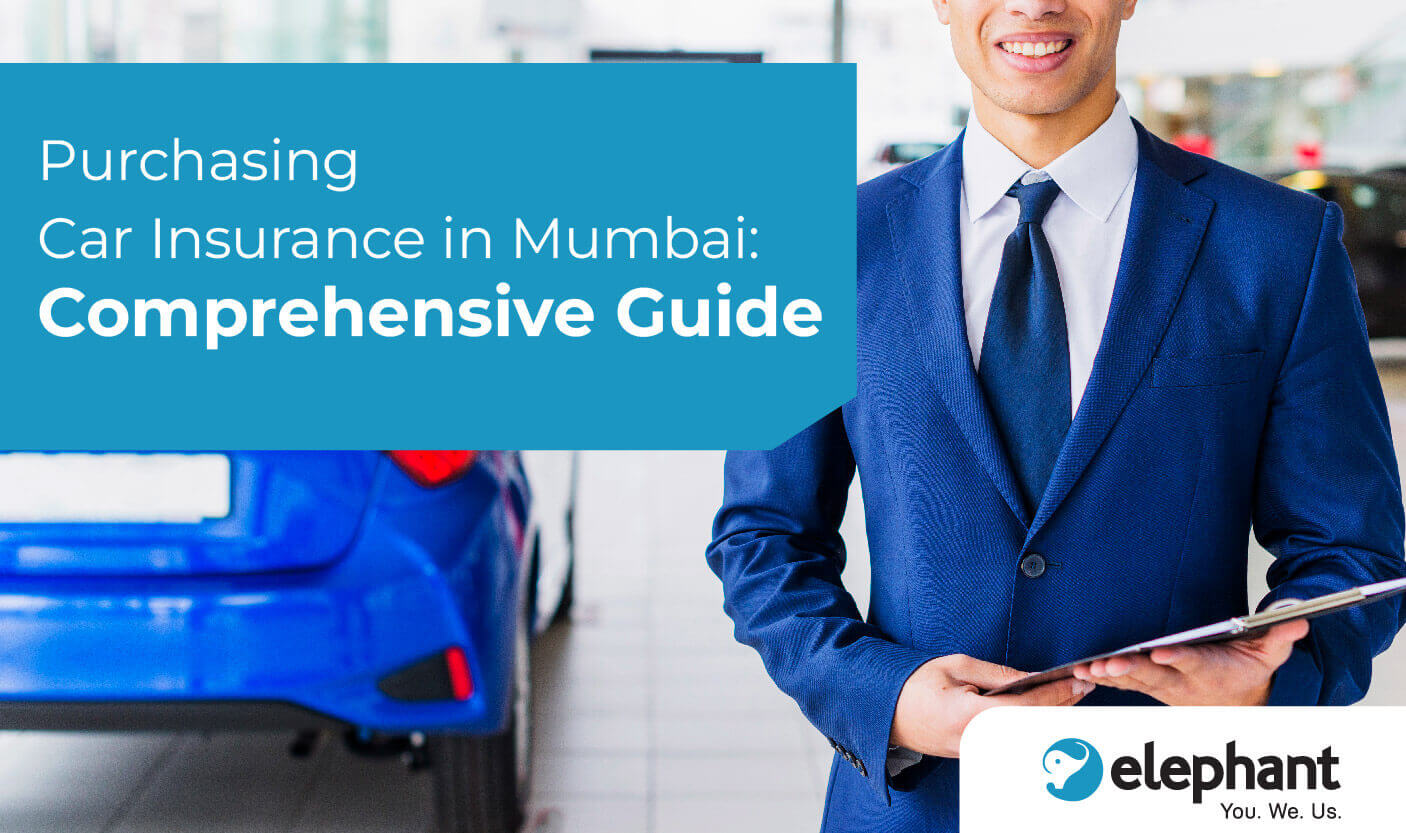
Purchasing Car Insurance in Mumbai: Comprehensive Guide
published on June 17, 2024
Love the hustle and bustle of Mumbai? But what about its traffic? As a car owner, it is clear that navigating the city’s traffic or challenges related to it is no small feat. Accidents and unforeseen circumstances may lead to expensive repairs, medical bills, and legal fees. Purchasing car insurance is one way to mitigate all of this. The Motor Vehicle Act of 1988 mandates vehicle insurance for all motor vehicles in the country.
Through this blog, we will help you get a better understanding of car insurance in Mumbai so that you can make an informed choice and drive down the buzzing roads of Mumbai in peace.
Why Purchase a Car Insurance in Mumbai?
Considering the current road circumstances and the high volume of traffic on the streets of Mumbai, it is crucial to have comprehensive car insurance coverage. The benefits are many:
- It offers complete compensation if your car is stolen.
- It shields your car from calamities such as floods and earthquakes.
- Reparation is paid for losses caused by terrorists, vandals, and rioters.
- It offers financial assistance where the owner or driver of the car meets with an accident and gets injured or killed.
Things to Consider When Buying Car Insurance in Mumbai
There are some factors you need to consider before purchasing car insurance. They are as follows:
- Choose an insurer known for prompt settlement of claims.
- Evaluate all available options under coverage. Check if there are extra features included in policies like roadside assistance, engine protection no depreciation element, etc.
- Compare insurance prices from different companies to balance between cost and coverage.
- Your requirements must be analyzed, then you should select additional covers for your policy accordingly. These additional covers add extra protection beyond what is already covered by your basic coverage.
- Check if the insurer has a competitive NCB program or not. It is the discount on premiums given by the insurer to the policyholder who has had no claims throughout the insurance period.
- Carefully read the policy terms and conditions to comprehend the conditions, exclusions, and restrictions and avoid surprises during claim settlement.
Also Read: Useful Tips to Consider When Buying Insurance for Your New Car
Steps to Purchase Car Insurance in Mumbai
Buying auto insurance in Mumbai? Follow these steps:
-
Research and Compare:
Start an inquiry about different insurers and their policies.
-
Choosing the Right Coverage:
Select the most appropriate cover depending on your personal needs.
-
Getting Quotes:
Request for quotes from various insurers. Let them be armed with specific details and they shall determine a precise quote for you.
-
Evaluating Add-Ons:
Your requirements should be evaluated and included in your comprehensive insurance plan.
-
Purchasing the Policy:
When you have selected an ideal policy, there is an option of buying it online or offline. For avoidance of problems during claims processing, accurate data must be provided.
-
Policy Documentation:
The said policy documents will be received once the purchase has been made. It must be carefully reviewed and kept somewhere it will not be overlooked. It also helps to have a paper copy on hand for easy reference, for instance, while using the digital version.
Common Mistakes to Avoid
Being aware of and avoiding the following mistakes may make car insurance purchases in Mumbai easier:
- Not obtaining proper insurance: To protect yourself against potential losses, ensure that you have the proper coverage, tailored to your specific requirements. Choosing a coverage plan that does not fit your needs to save money on premiums is not advisable.
- Not Considering Policy Exclusions: Being aware of what isn’t covered is crucial since every insurance has specific exclusions. This helps in preventing your claim from being denied.
- Avoiding Timely Renewal: Renewing your insurance may be a very important aspect that has to be done to avoid losing insurance coverage. Driving a car without appropriate insurance makes one prone to paying huge amounts of cash and or receiving fines.
- Ignoring Add-Ons: Though add-ons can slightly contribute to the rise in insurance costs, they are significant to have additional safety. As with anything, their benefits have to be weighed for one to decide on whether to take help or not.
- Not Utilising No Claim Bonus: With a clean driving record or no past claims, one should ensure they opt for the No Claim Bonus (NCB) to reduce the insurance premiums.
Also Read: How to Lower Car Insurance Premiums
Conclusion
Be mindful of the above factors when buying car insurance in Mumbai. Remember, obtaining comprehensive car coverage isn’t just vital but also a smart choice because of the city’s high traffic and high accident rate. By making an informed choice you can protect your car from unexpected disasters.
Call 1800 266 9693 to learn more about the different types of car insurance we offer, or send an email to support@elephant.in to speak to our experts! Additionally, you can go to Elephant.in to obtain the best car insurance!
*Terms and conditions apply. The information provided in this article is generic in nature and for informational purposes only. It is not a substitute for specific advice in your own circumstances. You are recommended to obtain specific professional advice from before you take any/refrain from any action. Tax benefits are subject to changes in tax laws. Please contact your tax consultant for an exact calculation of your tax liabilities.| EL/BLOGS/24-25/06
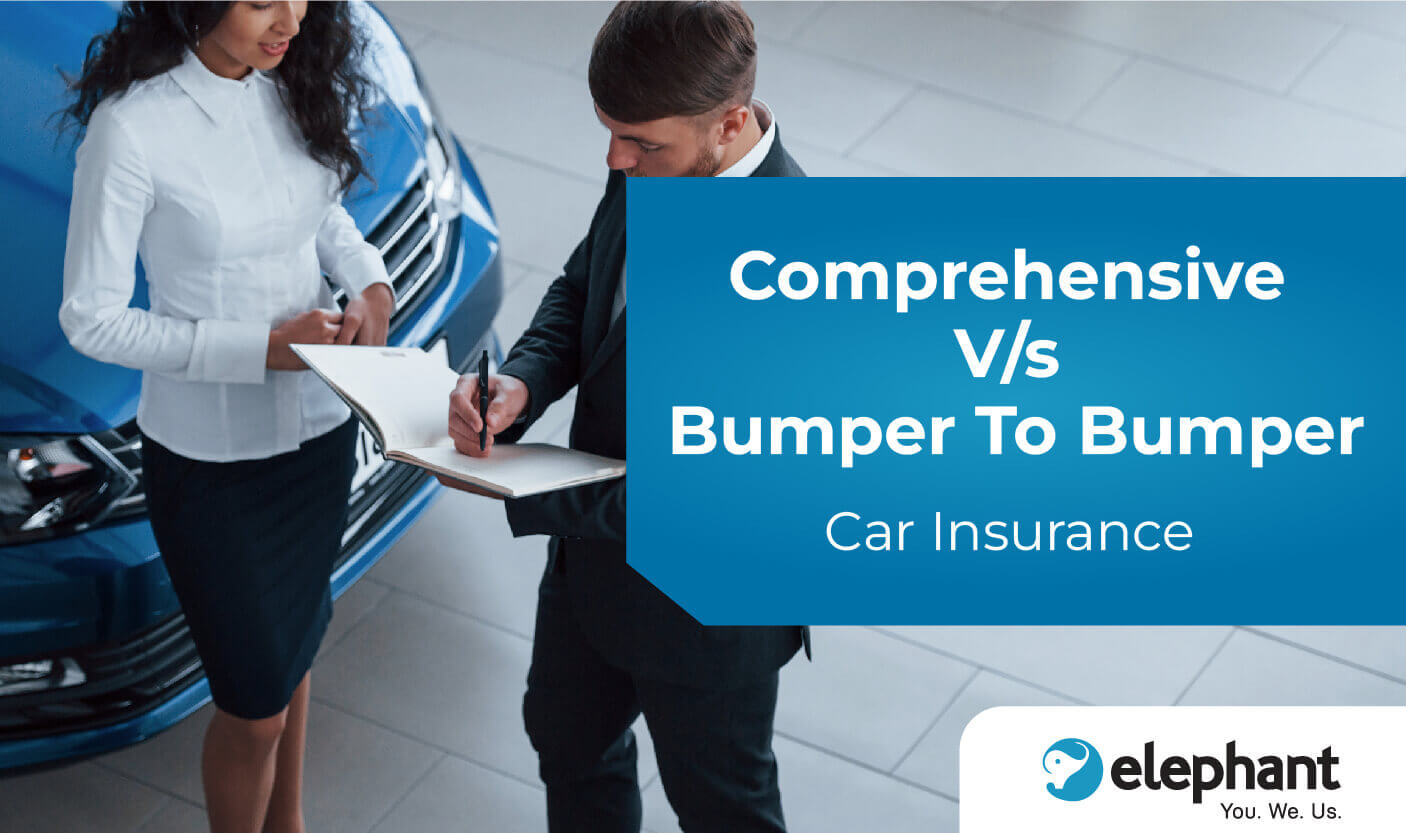
Difference Between Comprehensive And Bumper to Bumper Car Insurance
published on April 24, 2024
Choosing a car insurance that is perfectly fit to your needs can be a difficult task for many as there are so many options in the market. Comprehensive car insurance and bumper-to-bumper car insurance are the two most popular insurance policies in India. In this blog post, we will explore the key differences between the two insurance policies so that you make an informed decision while you are out in the market purchasing insurance.
What is a Comprehensive Car Insurance?
Comprehensive insurance can be considered as a huge shield that covers various aspects. It goes beyond the basic protection and offers protection against:
- Accidents: Met with an accident? This type of insurance covers the cost of repairs you may need after an accident.
- Theft: It repays you for the vehicle’s insured declared value () if it gets stolen.
- Fire: All the damages that may be caused to your car due to a fire breakout will be covered under this insurance policy
- Natural Disasters: It assists you by covering the cost of damages caused by disasters like floods and earthquakes.
- Riots & Strikes: Damages caused to your car due to these activities are also covered under this insurance.
In addition, you can tweak your insurance policy! Add-on covers are offered by many insurance providers:
- Engine Protect: In case your engine breaks down, this cover helps in covering for the costs of repairs or replacements.
- Return to Invoice: This cover reduces the gap between the vehicle’s current value and its on-road cost during claim settlement.
- Personal Accident Cover (PAC): In case of an accident where either you or the passengers in your car need financial assistance to meet the costs of injuries/hospitalisation, this cover comes to the rescue.
Here is the catch: When parts are replaced after a claim, depreciation (reduction in value due to age) is applied. This implies you might need to pay a portion of the repair and replacement costs from your hand. Also, your car insurance doesn’t cover the wear and tear of the car, electrical/mechanical breakdowns because of negligence, or
Bumper-to-Bumper Insurance: An Upgraded Protection
A supercharged version of comprehensive car insurance is called bumper-to-bumper car insurance. It offers every one of the advantages of comprehensive insurance, however with a significant advantage:
- No Depreciation on Parts: You get the full cost of repairs or replacements for most car parts after an accident, no matter what their age. You will not have to shell out money from your pocket.
- Enhanced Coverage: When compared to comprehensive car insurance, bumper-to-bumper car insurance provides broader coverage. This includes coverage for consumables like ointments and filters utilised during repairs.
Sounds perfect, right? Well, almost. Here are some considerations:
- Higher Premiums: Added security comes at a price. The insurance premiums for bumper-to-bumper car insurance are higher when compared to comprehensive car insurance.
- Renewal Restrictions: Some insurance providers put limits on who can get bumper-to-bumper car insurance, particularly for older cars. Check the renewal terms prior to picking this option.
Choosing Your Champion: Comprehensive vs. Bumper-to-Bumper
Depending on your car’s age and your tolerance of risk, the best choice will differ. Let’s break it down:
- New Cars (Up to 3 Years Old): Depreciation is negligible for new cars. An effective choice for such cars will be opting for comprehensive insurance with add-ons like engine protection and return to the invoice.
- Pre-Owned Cars (3 to 5 Years Old): Depreciation is considered for these cars. Opting for comprehensive insurance with a zero depreciation add-on for parts like engines and headlights is advisable.
- Older Cars (Above 5 Years Old): Depreciation of value can be critical for older cars. As the complete repair costs are covered under a bumper to bumper car insurance, it becomes a more alluring choice for car owners
Conclusion
To maintain your peace of mind and to safeguard your prized possession: your car, it is important that you choose the perfect insurance protection that suits your needs. Once you comprehend the various coverage options and their requirements along with their differences, you can make a well-informed decision and choose the perfect insurance plan that is suited to your needs.
*Terms and conditions apply. The information provided in this article is generic in nature and for informational purposes only. It is not a substitute for specific advice in your own circumstances. You are recommended to obtain specific professional advice from before you take any/refrain from any action. Tax benefits are subject to changes in tax laws. Please contact your tax consultant for an exact calculation of your tax liabilities.| EL/BLOGS/24-25/02

All You Need To Know About Bumper To Bumper Car Insurance
published on April 20, 2024
When an extra cover of zero depreciation is purchased alongside comprehensive insurance, it is referred to as bumper-to-bumper car insurance. The cover ensures that the policyholder is repaid with no deductions that happen because of depreciation in case of an accident. This blog will explore the details of this protection so you are informed before settling on a protection plan that is good for your requirements.
What is Bumper-to-Bumper Car Insurance?
It gives complete financial protection to your car and is an appealing choice for car owners when compared with standard car insurance. A normal comprehensive policy considers depreciation during the process of claims which directly impacts your claim amount. While a bumper-to-bumper car insurance, the policyholder gets the full claim amount as it doesn’t consider depreciation.
What is Covered Under a Bumper-to-Bumper Car Insurance?
In bumper-to-bumper car insurance, protection for various parts of your car is given. It doesn’t take into account deductions due to depreciation and totally compensates for the damages caused. This means that if you meet with an accident, you will be compensated completely, with no deductions.
The parts that are covered are as follows:
| Bumpers | Damages caused to both the bumpers (Front and back) |
| Exterior Tail lights and Head Lights | Damaged or broken headlights and tail lights |
| Side Mirrors | Damaged or broken side mirrors |
| Windshield & Windows | Cracked or shattered windshields and windows |
| Alloy Wheels | Dented or scratched alloy wheels |
What are the Exclusions in Bumper-to-Bumper Car Insurance?
Bumper-to-bumper car insurance gives total coverage but there are certain exclusions. They are as follows:
| Wear and Tear | Gradual damage to parts due to regular use (e.g., faded paint) |
| Mechanical Breakdown | Engine failure or other mechanical issues not caused by an accident |
| Engine Damage from Oil Leakage | Damage to the engine due to a leak |
| Accidents Due to Negligent Driving | If the policyholder’s negligence during driving caused the damages |
| Unapproved Modifications | Damages to parts not approved by the car manufacturer |
| Natural Disasters (Unless Specified) | Floods, earthquakes, or other natural disasters (check your policy for details) |
How to Purchase a Bumper-to-Bumper Car Insurance?
While buying or renewing a comprehensive insurance policy, bumper-to-bumper insurance can be purchased with it. To get zero depreciation coverage, you need to pick this add-on while customising your insurance plan.
Tips to Purchase A Bumper-to-Bumper Car Insurance
Car owners need to consider these things before buying bumper-to-bumper car insurance. They are as per the following:
- Compare quotes given by various insurance providers to track down the best fit for your requirements.
- Ensure the insurance provider you choose is trustworthy and has a decent claim settlement record.
- Review the agreements of the insurance policy carefully to understand what is covered and what are the exclusions under the policy.
Factors Affecting Premiums for Bumper-to-Bumper Car Insurance
The premiums are affected by things like the IDV (Insured Declared Value) of your car, your driving record, your age, the make and model of your car, and your location. Your premiums can be brought down by:
- Increasing your voluntary deductible
- Maintaining a clean driving record
- Installing anti-theft devices
- Renewing your policy promptly
- Avoiding frequent claims
Conclusion
For Indian car owners, it is ideal to purchase bumper-to-bumper car insurance in the present day and age as the expenses of owning a car are rising. Alongside coverage, it additionally gives genuine peace of mind to the car owner. You can safeguard your car by choosing smartly assuming you understand what the policy covers, the premiums you need to pay, and its advantages. It stays the most ideal choice for safeguarding your car as it gives total coverage which ensures financial well-being.
Want to get car insurance tailored to your needs? Reach out to us at support@elephant.in or on our toll-free support number- 1800 266 9693, to talk to our experts! We will help you acquire a car insurance that is customised to your needs!
*Terms and conditions apply. The information provided in this article is generic in nature and for informational purposes only. It is not a substitute for specific advice in your own circumstances. You are recommended to obtain specific professional advice from before you take any/refrain from any action. Tax benefits are subject to changes in tax laws. Please contact your tax consultant for an exact calculation of your tax liabilities.| EL/BLOGS/24-25/01
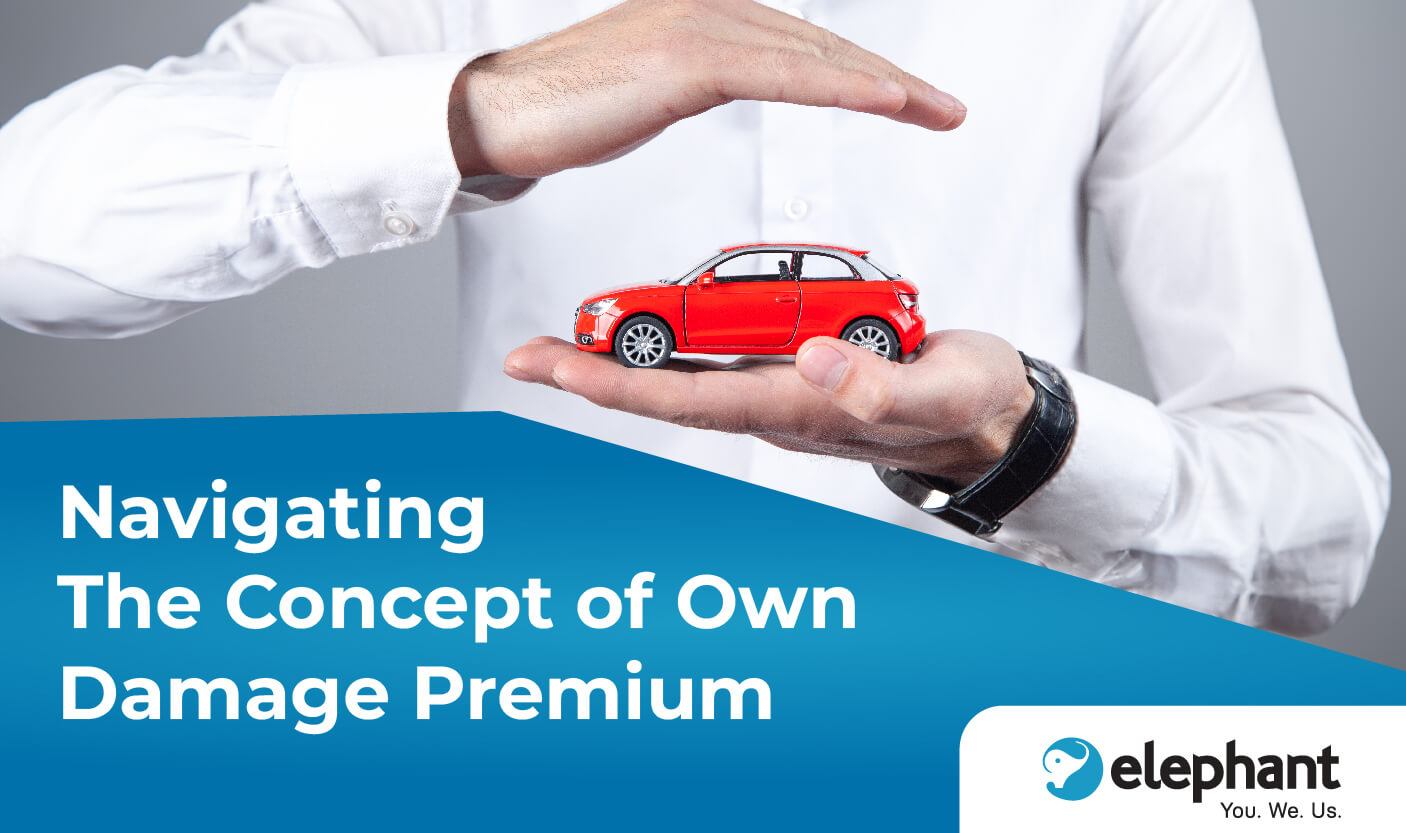
Navigating The Concept of Own Damage Premium
published on February 26, 2024
In the intricate world of car insurance, understanding the nuances of premiums and coverage is essential for every vehicle owner. One question that often arises is– What is the basic Own Damage cover in car insurance? In this in-depth guide, we’ll dissect this crucial element, shedding light on its intricacies and emphasising why it stands as a cornerstone in the foundation of your car insurance policy.
The Importance of Own Damage Cover
At its essence, the Own Damage cover serves as a financial safeguard for your vehicle. It provides coverage for impairments to your vehicle against a pool of potential risks. Be it a minor fender bender, the aftermath of a severe hailstorm, or theft, this premium acts as a safety net, assuring your financial burden is dealt with appropriately in case of incidental damages.
Recognising that the basic Own Damage cover is not a one-size-fits-all concept is imperative. It ensures that financial assistance is provided for repairs or replacements, leaving no room for expenses. OD insurance can be tailored as it is flexible and one can add additional coverage options like zero depreciation, engine protection, and roadside assistance.
Components of Own Damage Cover Premiums
Diving deeper into the concept of basic Own Damage premium, it’s crucial to grasp the distinct components that collectively determine the amount you pay for coverage. The components are as follows:
- Car’s Age
- Driving Habits
- Car’s Make and Model
- Location of Registration
- Insured Declared Value (IDV)
The Benefits of Own Damage Cover
When looking for car insurance, you can choose between liability or comprehensive insurance. However, the big disadvantage of buying third-party insurance is that it does not cover the vehicle itself. Third-party liability insurance only covers the legal liability of the owner of the vehicle in the event of an accident, including liability for injury, death or damage to third parties.
On the other hand, comprehensive insurance includes both liability insurance and the Own Damage Cover, which protects the car against damage, theft, vandalism, natural disasters and man-made accidents such as riots and the car owner/driver. In addition, you can further enhance a comprehensive plan with additional add-on options that you can purchase from the insurance company.
Strategies for Reducing Own Damage Cover Premium
Now that we’ve analysed the multifaceted nature of the Own Damage Cover, let’s examine actionable strategies for handling and optimising this crucial aspect of your car insurance.
- Increase Voluntary Deductibles: One way to tailor your OD car insurance is by selecting the correct voluntary deductibles. In the event of a claim, you agree to pay a portion of the repair or replacement cost, and an additional payment is made by the insurer called the deductible. Choosing to pay a higher deductible may lower premium costs, but you will have to give out more in the event of a claim.
- Insured Declared Value (IDV): Choose an IDV that is equivalent to the actual value of the car as a higher IDV leads to a higher premium whereas a lower IDV may not provide sufficient cover.
- Transfer of No-Claim Bonus (NCB): If you previously had OD or Comprehensive Car insurance, be sure to transfer your NCB to your current policy to receive the accrued discount on the new policy.
- Choosing plans based on usage: Pay-as-you-drive plans are a kind of vehicle insurance that tailors your premium to the frequency of your driving. You pay a base rate and extra charges based on the distance you drive.
By enforcing these strategies, you actively manage your Own Damage Cover premium while receiving comprehensive coverage and maximising cost-effectiveness.
Conclusion
As we conclude this extensive exploration into the realm of Own Damage premium, it’s evident that this is more than just a technical aspect of car insurance—it’s a fundamental element that directly influences the longevity and financial security of your vehicle. Visit Elephant.in to learn more about our insurance options, get free quotes, and secure the peace of mind you deserve!
Email us at support@elephant.in or call us on our toll-free support number- 1800 266 9693 to get in touch with our experts to solve any further queries!
*Terms and conditions apply. The information provided in this article is generic in nature and for informational purposes only. It is not a substitute for specific advice in your own circumstances. You are recommended to obtain specific professional advice from before you take any/refrain from any action. Tax benefits are subject to changes in tax laws. Please contact your tax consultant for an exact calculation of your tax liabilities.| EL/BLOGS/23-24/06
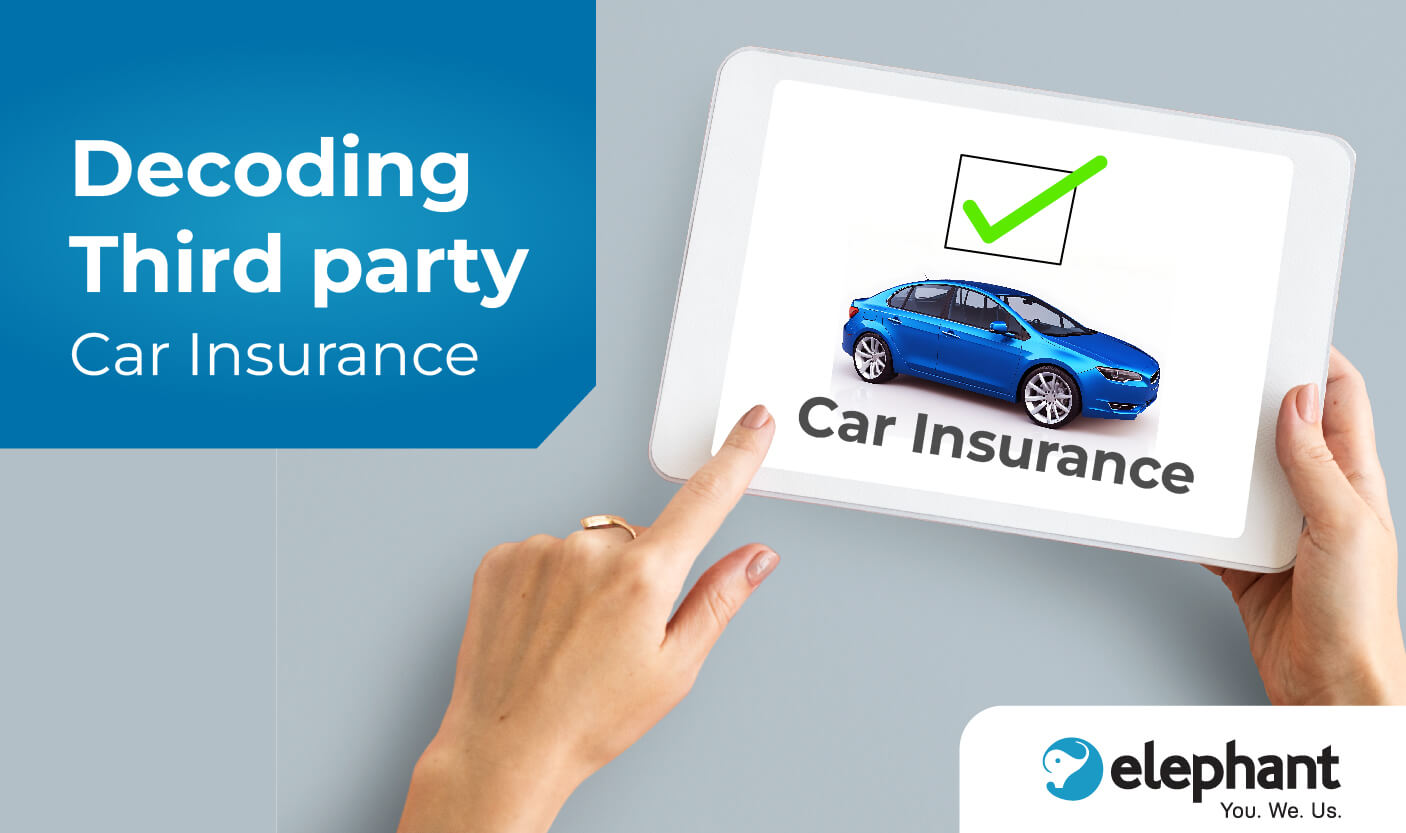
Decoding Third-Party Car Insurance
published on February 26, 2024
Third-party (TP) Premium is a complex term in the diverse landscape of car insurance. In this blog post, we will explore and analyse the complexities of third-party premiums and answer the vital question: What is TP Premium in car insurance? It is extremely important for car owners to know about TP Premiums as they directly impact the total cost of your insurance coverage.
The Basics of TP Premium
Let’s begin by breaking down TP Premiums. TP, short for ‘Third Party’, is that section of your motor insurance policy that steps in when there’s damage or injury to others. However, comprehensive car insurance goes the extra mile, bundling third-party liability insurance and own damage cover, which protects your car from a variety of scenarios – theft, vandalism, natural disasters, and even man-made mishaps like riots. By paying an extra premium, it also covers bodily damages caused to the car owner or driver. A comprehensive car insurance policy can be further enhanced by bundling add-on covers, but keep in mind that the insurance premium will increase. It is essential to understand how TP insurance works to make safe and sound decisions to protect your car.
What Does Third-Party Liability Insurance Do?
Your insurer will have to be informed about an event of claim and a thorough investigation will take place. According to your case, the outcome will be decided. Post-investigation, if you are eligible, the insurer will cover your monetary and legal liabilities.
Important Advantage of Third-Party Liability Insurance
Damages caused to the insured vehicle or its owner in the event of an accident are not covered under Third-party Liability insurance. Comprehensive car insurance will be much better in getting overall insurance protection.
Third-party liability insurance, on the other hand, pays for third parties’ property losses or personal injuries in the event of an accident. It also covers potential legal liability expenses following an accident.
Factors Influencing TP Premium
Insurance plays a vital role in deciding the car prices in India. The overall price of the car includes the insurance costs. The cost of insurance coverage will have to be taken into consideration when the car is bought by the car owner. The risk associated with the car model is calculated and considered by insurers in determining insurance premiums. The higher the risk of being in an accident or stolen, the more the insurance premium will be, increasing the overall value of the car.
In India, it is a legal mandate for all cars to get third-party liability car insurance. The third-party liability car insurance rates are set by the Insurance Regulatory and Development Authority of India (IRDAI). As it is mandatory to get third-party insurance, the premium is factored into the total cost of the car.
Insurers consider various factors when calculating the third-party premium. The factors are:
- Make, model and age of the car
- Engine Cubic Capacity (CC)
Understanding these influencing factors empowers you to make informed decisions when selecting your coverage, ensuring that your TP Premium aligns with your budget and provides adequate protection.
Balancing TP Premium and Overall Coverage
When navigating the world of car insurance, the balance between TP Premiums and overall coverage is crucial. While it may be tempting to opt for the mandatory minimum third-party liability coverage to reduce your premiums, it is important to consider the potential financial consequences in the event of a serious accident.
Investing in a slightly higher TP Premium to add additional liability can provide significant protection to protect you from uncovered costs that may arise if your coverage is lacking. It’s a delicate balance that requires careful consideration of your financial situation, driving habits and potential risks.
Furthermore, consider additional coverage options beyond the TP insurance coverage. Comprehensive coverage, which includes protection for your vehicle, can provide an extra layer of security. Evaluate your needs and assess whether additional coverage elements are warranted to ensure comprehensive protection.
Conclusion
All in all, an important part of being a responsible vehicle owner is understanding what the TP Premiums are in car insurance. It’s not just a financial commitment, it’s also a responsibility to make sure you can hit the road with confidence, knowing you have the protection you need.
Do you require help in selecting the best policy for your car? You may get in touch with Elephant.in today! Email us at support@elephant.in or call us on our toll-free support number- 1800 266 9693, to talk to our experts!
*Terms and conditions apply. The information provided in this article is generic in nature and for informational purposes only. It is not a substitute for specific advice in your own circumstances. You are recommended to obtain specific professional advice from before you take any/refrain from any action. Tax benefits are subject to changes in tax laws. Please contact your tax consultant for an exact calculation of your tax liabilities.| EL/BLOGS/23-24/07

